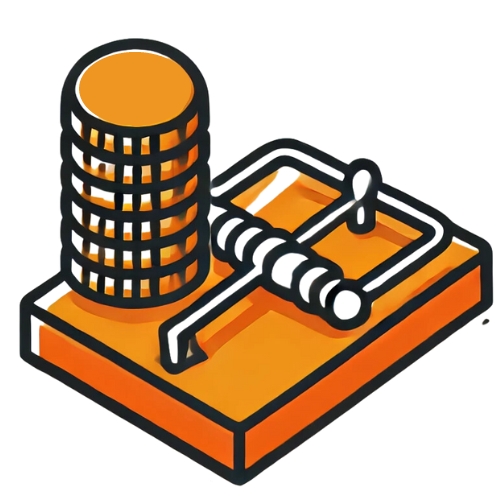
In a time when digital fraud is becoming more common, knowing how to report a scammer is vital for safeguarding yourself and others. Scammers often use complex strategies to deceive people, making them challenging to identify and stop. Understanding the proper steps to report fraudulent activity can assist authorities in tracking down these criminals and preventing additional scams. So, how can you make sure your report is effective and aids in combating cybercrime?
Key Takeaways
- Report Scams to Help Stop Fraud: Reporting scams contributes to the removal of fraudulent websites and advertisements, creating a safer online environment for everyone.
- Recognise Scammers’ Methods: Your reports assist authorities in understanding scam techniques, helping them stay informed about changing fraud methods.
- Protect Yourself and Others: Alerting authorities and the public about scams helps prevent further harm and enhances community safety.
About Arcadia Finance
Access loans effortlessly through Arcadia Finance. With no application fees and a choice of 19 reputable lenders, all compliant with South Africa’s National Credit Regulator standards, you can enjoy a streamlined process and trustworthy options designed to meet your financial needs.
What is a Scammer?
A scammer is someone who engages in fraudulent schemes or uses deception to trick others into giving away their money, personal information, or other valuable assets. Scammers often use various tactics such as impersonation, false promises, and manipulation to exploit their victims. Their activities can take place over the phone, through email, via social media, or on websites. The intention is usually to gain access to financial accounts, commit identity theft, or obtain money through deceitful means. Awareness and caution are crucial to avoid falling victim to such deceptive practices.

Why Report a Scam?
By reporting a scam, you enable us to work together with various organisations to address and remove fraudulent websites, misleading advertisements, and scam-related contact details. Your permission allows us to take active measures to eliminate these risks from the online environment, thereby contributing to a safer digital space for everyone.
Deepen Our Knowledge of Scammers’ Methods
Understanding the strategies and patterns used by scammers within South Africa allows us to refine our responses. This awareness ensures that our efforts to combat fraud are effective and current, providing better protection for the public.
Help Protect Others
When you share information about scams, you play an essential part in our work to warn the community about new or emerging fraudulent activities. Your input helps us spread warnings and preventive advice, assisting others in identifying and avoiding potential scams before they cause harm.
Remain Alert and Informed
By working together, we can all improve our ability to safeguard ourselves from scams. Staying informed about the latest fraud trends and knowing what warning signs to look for helps us build a stronger community against fraudulent activities.
Find out how to report and avoid loan scams in South Africa, helping you stay one step ahead of fraudulent lenders.
4 Common Types of Scams in South Africa
Scams are an unfortunate reality in today’s digital and connected world. In South Africa, various types of scams are common, targeting both individuals and businesses. Here are four types of scams to be aware of:

Phishing Scams
Phishing scams involve fraudsters pretending to be legitimate organisations or individuals to steal sensitive information such as passwords, credit card details, and personal identification numbers. These scams often come via emails, text messages, or phone calls that seem to be from trusted sources like banks or government agencies.
How It Works:
- The victim receives a communication that appears genuine.
- The message contains a link to a fake website or requests personal information.
- Once the victim provides the information, the scammer uses it for fraudulent activities.
Example: A victim gets an email that looks like it’s from their bank, asking them to click a link to verify their account details. The link leads to a fake website where the victim unwittingly enters their login details, which are then captured by the scammer.
Learn how to recognise scam messages and emails to prevent falling victim to phishing attempts.

Investment Scams
Investment scams promise high returns with minimal or no risk to lure victims into giving away their money. These scams can take various forms, including Ponzi schemes, pyramid schemes, and fake investment opportunities.
How It Works:
- The scammer offers an appealing investment opportunity.
- High returns are promised within a short timeframe.
- Initial investors may receive some returns to build trust and encourage further investment.
- Eventually, the scheme collapses, and the scammer disappears with the victims’ money.
Example: A scammer promotes a new cryptocurrency investment with guaranteed high returns. Early investors receive some payouts, but as more people invest, the scammer vanishes, leaving most investors with significant losses.

Advance Fee Scams (419 Scams)
One common type of fraud is the ‘Advance Fee Scam’, also known as a ‘419 Scam’ in South Africa. This scam often begins when a con artist offers an attractive loan offer. The fraudster might either create a fake company or pose as a legitimate lender.
How It Works:
- The scammer contacts the victim with an enticing loan offer.
- The victim is encouraged to apply for the loan, often due to urgent financial needs.
- An advance fee (sometimes called a deposit) is requested before the loan can be provided.
- After the victim pays the fee, the scammer stops all communication, and the loan never materialises.
Example: A victim receives an email from a supposed lending institution offering a low-interest loan. Desperate for funds, the victim applies and is asked to pay a deposit to secure the loan. After the deposit is paid, the scammer disappears, leaving the victim without the loan and out of pocket.
Methods of Contact:
- Email: Scammers send professional-looking emails from fake or spoofed addresses.
- Phone Calls: Fraudsters may call victims directly, using convincing scripts.
- SMS: Text messages offering loans with links to fake websites are common.
- Social Media: Platforms like Facebook and WhatsApp are used to contact potential victims.

Romance Scams
Romance scams involve fraudsters creating fake profiles on dating websites or social media to form relationships with unsuspecting individuals. Once trust is established, the scammer starts requesting money, often citing emergencies or travel expenses.
How It Works:
- The scammer creates a fake profile and starts a relationship with the victim.
- Over time, they build emotional connection and trust.
- The scammer then invents a story requiring financial assistance.
- Once the victim sends money, the scammer either continues to make new requests or disappears altogether.
Example: A victim meets someone on a dating site who claims to be working overseas. After a few weeks of communication, the scammer asks for money to help with a medical emergency. The victim sends the money, and the scammer continues to ask for more funds for various made-up reasons.

What To Do if You Were Scammed
If You’ve Paid the Scammer or Provided Personal Information
- Report the incident to the police as soon as possible and obtain a case number to document your complaint.
- Forward the case number, along with all relevant correspondence and details, to the affected business. They may be able to assist in the investigation.
- Contact your bank immediately to alert them to the potential breach of your financial information and take steps to secure your accounts.
If a Scammer Gained Control of Your Computer or Mobile
- For Computer Access: Improve your security by updating your antivirus software, performing a thorough system check, and removing any detected threats. Afterwards, change your passwords and review your security settings.
- For Phone Control: Contact your network provider to regain control over your mobile number and account. Once access is restored, update your password.
- For Financial Accounts: Review your bank and credit card statements for any unauthorised transactions. Notify your financial institution immediately of any irregular activities.
If You’ve Received a Suspicious Message or Email
If the suspicious message appears to come from a friend, contact them directly to inform them of the potential compromise of their personal information and advise them on steps to secure their accounts. If the message seems to be from a business or brand, notify them promptly. They will typically investigate and inform their customers, helping to prevent others from falling victim to the same scam.
Reporting Other Cybercrimes
For reporting other cybercrimes, visit the Cybercrime website. It provides a detailed list of online forms and email addresses to help with the reporting and investigation of various types of cyber-related crimes.
Legal Framework for Fraud in South Africa
| Law/Regulation | Description | Implications for Citizens |
|---|---|---|
| Prevention of Organised Crime Act (POCA) | Targets organised crime, money laundering, and criminal gang activities, including fraud. | Provides a basis for asset seizure and stiff penalties for organised fraud. |
| Protection of Personal Information Act (POPIA) | Regulates the processing of personal information; mandates secure handling to prevent fraud. | Ensures personal data protection; rights to query and object to data usage. |
| Financial Intelligence Centre Act (FICA) | Aims to combat money laundering and the financing of terrorism. Requires verification of identity. | Enhances financial security and due diligence practices in financial institutions. |
| Electronic Communications and Transactions Act (ECTA) | Governs transactions and communications via electronic means, including fraud prevention measures. | Provides legal recognition of electronic records and facilitates safe online transactions. |
| The Companies Act | Outlines corporate governance, accountability, and transparency requirements to prevent fraud. | Ensures that companies operate with financial integrity and accountability. |
| Fraud Act | Defines fraud, sets penalties, and outlines prosecution processes for fraud cases. | Clearly delineates what constitutes fraud and the legal recourse available. |

Who Should I Report Fraud To?
If you come across a fraudulent email, you should notify the Internet Service Provider responsible for the email’s origin. For example, emails from Hotmail can be reported to abuse@hotmail.com, while those from Yahoo should be sent to abuse@yahoo.com.
When your identity document or driver’s licence is lost or stolen, it is essential to report the loss to the South African Police Service (SAPS) and obtain an affidavit. This document is crucial for alerting your bank and credit providers to protect your accounts from unauthorised transactions.
If you lose these documents or notice suspicious activity involving your personal details, contact the South African Fraud Prevention Services (SAFPS). Here, you can initiate a protective registration to safeguard your identity. Reach SAFPS at 0860 101 248 or via email at SAFPS@safps.org.za.
To report a 419 Scam or an Advance Fee Scam, forward the details to 419scam@saps.org.za.
For more information on fraud and related activities, you may visit the South African Banking Risk Information Centre (SABRIC), where you can find the latest information on banking scams.
Conclusion
Reporting a scammer is an important step in addressing the increasing problem of digital fraud. By knowing how to report fraudulent activity and recognising common scams, such as the Advance Fee Scam, you can play a key role in protecting yourself and others. Reporting scams not only helps stop the immediate threat but also assists authorities and organisations in improving their responses to evolving fraudulent tactics. Whether you’ve been targeted or have noticed suspicious activity, taking quick action and sharing your experience can greatly contribute to a safer online environment. Staying alert, informed, and proactive is essential for protecting your personal and financial information from scammers.
Frequently Asked Questions
If you suspect you’ve fallen victim to a scam, the first step is to cease all communication with the scammer and refrain from making any additional payments. Document all relevant details, including emails, messages, and transaction records. If you’ve shared any financial information, promptly report the scam to your bank or financial institution. Additionally, it’s crucial to report the incident to local law enforcement and notify the relevant online platforms or service providers involved.
In South Africa, you can report scammers to the South African Police Service (SAPS) by visiting your local police station or filing a report online via the SAPS website. Additionally, you can report fraudulent activities to the South African Fraud Prevention Service (SAFPS) and the National Consumer Commission (NCC). Both organisations work to tackle and reduce financial fraud.
Yes, you should report the scam to the online platform or social media site where the scammer contacted you. Most platforms, including Facebook, Instagram, and WhatsApp, have dedicated reporting mechanisms for fraudulent activity. Reporting the scam helps these platforms take action to remove the scammer’s account and protect other users.
Yes, it’s important to report scammers even if you haven’t lost any money. Reporting helps authorities monitor scam trends and prevent others from being targeted. Your report may also assist in identifying and stopping fraudulent operations.
To protect yourself from future scams, stay informed about common fraud tactics and be cautious when dealing with unfamiliar contacts or offers that seem too good to be true. Always verify the legitimacy of offers and organisations before sharing personal or financial information. Use strong, unique passwords for your online accounts and enable two-factor authentication whenever possible.
Fast, uncomplicated, and trustworthy loan comparisons
At Arcadia Finance, you can compare loan offers from multiple lenders with no obligation and free of charge. Get a clear overview of your options and choose the best deal for you.
Fill out our form today to easily compare interest rates from 19 banks and find the right loan for you.


